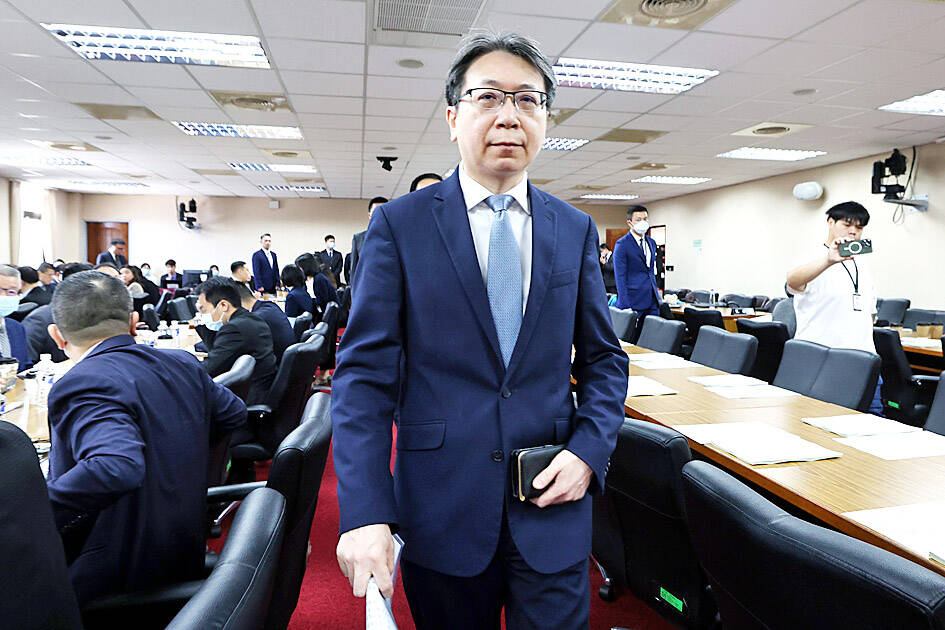Beijing’s widened anti-espionage legislation is likely to pose heightened risks to Taiwanese visiting or transiting through China, National Security Bureau Director-General Tsai Ming-yen (蔡明彥) said yesterday.
The amended Counterespionage Law, which was passed by the Chinese National People’s Congress on Wednesday last week and is to take effect in July, would have an impact on the safety of Taiwanese in China, Tsai told lawmakers at the Legislative Yuan in Taipei.
The legislation broadens the definition of spying to encompass being affiliated with “surrogates” of foreign intelligence agencies, “Internet-based espionage” and “activities that affect China’s economic interests,” he said.

Photo: CNA
These developments are worrying for Taiwanese entrepreneurs, journalists and human rights advocates visiting or transiting through China, and could cause cross-strait relations to deteriorate, Tsai said.
Former military service members, civil servants, and former and current members of civic groups should be aware that their smartphones or other electronic devices could be searched by Chinese customs officials for incriminating images or texts, he said.
People could face legal repercussions for things they have done or said outside of China’s jurisdiction, he told legislators.
Beijing’s strategy of facilitating unification through cross-strait exchanges conflicts with its efforts to retain its hold on power by regulating interactions among Chinese, which would make dealing with China more fraught for Taiwanese, he said.
An official familiar with the matter said that the amended law’s definition of spying can include speaking negatively about China on the Internet, conducting a public opinion survey, or taking cellphone pictures of rare earth mining sites.
Being overly solicitous to representatives of China’s state-owned enterprises, hiring former employees of Chinese businesses, visiting Xinjiang or Tibet, or drawing a map for personal use could lead to criminal charges, the official said on condition of anonymity.
Taiwanese business owners could face false accusations of spying from their competitors, they added.
China’s counterespionage act — which appeared to have been written to target foreign nationals — empowers authorities to define almost any undesirable activity as spying, National Cheng Kung University political science professor Hung Chin-fu (洪敬富) said.
The legislation is likely to have far-reaching consequences for China, including scaring off potential investors and sparking a capital flight from the country, he added.

A magnitude 5.6 earthquake struck off the coast of Yilan County at 12:37pm today, with clear shaking felt across much of northern Taiwan. There were no immediate reports of damage. The epicenter of the quake was 16.9km east-southeast of Yilan County Hall offshore at a depth of 66.8km, Central Weather Administration (CWA) data showed. The maximum intensity registered at a 4 in Yilan County’s Nanao Township (南澳) on Taiwan’s seven-tier scale. Other parts of Yilan, as well as certain areas of Hualien County, Taipei, New Taipei City, Taoyuan, Hsinchu County, Taichung and Miaoli County, recorded intensities of 3. Residents of Yilan County and Taipei received

Taiwan has secured another breakthrough in fruit exports, with jujubes, dragon fruit and lychees approved for shipment to the EU, the Ministry of Agriculture said yesterday. The Animal and Plant Health Inspection Agency on Thursday received formal notification of the approval from the EU, the ministry said, adding that the decision was expected to expand Taiwanese fruit producers’ access to high-end European markets. Taiwan exported 126 tonnes of lychees last year, valued at US$1.48 million, with Japan accounting for 102 tonnes. Other export destinations included New Zealand, Hong Kong, the US and Australia, ministry data showed. Jujube exports totaled 103 tonnes, valued at

TRUST: The KMT said it respected the US’ timing and considerations, and hoped it would continue to honor its commitments to helping Taiwan bolster its defenses and deterrence US President Donald Trump is delaying a multibillion-dollar arms sale to Taiwan to ensure his visit to Beijing is successful, a New York Times report said. The weapons sales package has stalled in the US Department of State, the report said, citing US officials it did not identify. The White House has told agencies not to push forward ahead of Trump’s meeting with Chinese President Xi Jinping (習近平), it said. The two last month held a phone call to discuss trade and geopolitical flashpoints ahead of the summit. Xi raised the Taiwan issue and urged the US to handle arms sales to

BIG SPENDERS: Foreign investors bought the most Taiwan equities since 2005, signaling confidence that an AI boom would continue to benefit chipmakers Taiwan Semiconductor Manufacturing Co’s (TSMC, 台積電) market capitalization swelled to US$2 trillion for the first time following a 4.25 percent rally in its American depositary receipts (ADR) overnight, putting the world’s biggest contract chipmaker sixth on the list of the world’s biggest companies by market capitalization, just behind Amazon.com Inc. The site CompaniesMarketcap.com ranked TSMC ahead of Saudi Aramco and Meta Platforms Inc. The Taiwanese company’s ADRs on Tuesday surged to US$385.75 on the New York Stock Exchange, as strong demand for artificial intelligence (AI) applications led to chip supply constraints and boost revenue growth to record-breaking levels. Each TSMC ADR represents